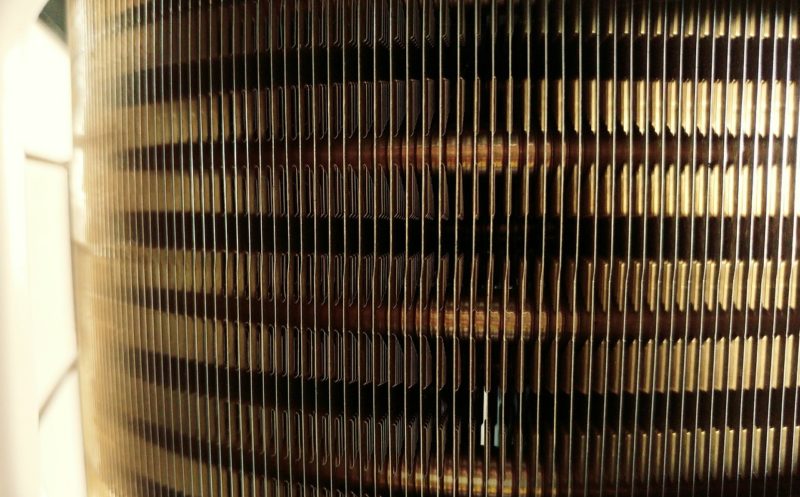April 13, 2023
Why Is My AC Blowing Warm Air – 7 Troubleshooting Tips


When the weather is hot outside, you expect your air conditioner to kick on and cool your home off fast. So, what happens if you notice your home isn’t cooling off, and warm air is coming out of the vents? Don’t panic – most of the time, this is a simple fix that you may even be able to do yourself.
Our Raleigh AC Repair team is here to bring you some tips to help keep your air conditioning system running smoothly throughout the summer months. From changing the filters and performing regular maintenance to checking for leaks, our team of experienced technicians can help you get the most out of your AC unit. We also specialize in emergency services so if something does go wrong, we’ll be there as soon as possible to get it fixed. No matter what your AC needs are, Bowman Mechanical Services in Raleigh is here to help you keep cool all summer long!
So, Why is Your AC Blowing Warm Air?
Check Your Thermostat Settings
Okay, we know this may sound silly, but you’d probably be surprised at how often someone has called for an AC repair only for the problem to be that the thermostat is on the wrong setting. So, the first thing you need to do is head to your thermostat and look for:
- The thermostat is set to “cool,” rather than “heat.” If it is, just switch it back over to cool.
- The fan is set to “auto,” rather than “on.” If the fan is set to “on,” it will blow non-stop, even when the AC is resting, so it will just blow warm air through the vents rather than cool. Switch it to auto, and it should be fine.
Clogged Air Filters
Clogged air filters can be the cause of an AC blowing warm air. A clogged filter prevents the airflow from passing through and therefore restricts the flow of cool, refreshing air being released into the room. This is especially true if the filter has been in use for several months without being replaced or cleaned. In addition, clogged filters can also cause high-pressure build-up within the system, leading to other problems such as frozen coils or compressor failure.
It’s important to ensure that your home’s AC filters are regularly changed every three months. Not only will this ensure maximum efficiency and improved performance of your AC unit, but it will also help prevent any avoidable issues such as warm air due to clogged filters. Additionally, homeowners should also make sure that their units are serviced annually by a qualified technician who can detect any potential issues with the system before they become major problems. Preventative maintenance is key when it comes to keeping your AC running smoothly and ensuring that it doesn’t blow warm air due to clogged filters.
Dirty or Frozen Evaporator Coils
If your AC is blowing hot air, it could be due to dirty or frozen evaporator coils. Dirty evaporator coils can cause a decrease in airflow and reduce the unit’s cooling efficiency. This will make the air that comes out of the vents feel warmer than normal. In addition, dirt and debris can block the coils, making them absorb heat from the surrounding environment instead of cooling it. If left unchecked, this issue can get worse over time and lead to your AC blowing warm or even hot air.
Frozen evaporator coils are another potential cause of warm air coming from your AC. When moisture on the evaporator coils drops below freezing, ice can form on them which blocks their ability to absorb heat from inside your home. As a result, no cool air will be produced by your unit and instead, you’ll feel nothing but hot air coming out of the vents. You may also notice frost build-up around other parts of your AC unit if this is happening. Trying to run your air conditioner with frozen or clogged coils can lead to overheating the unit or wearing out the compressor, so if you suspect this is the problem, try these steps:
- Turn off the air conditioner at the thermostat.
- Open the access panel by removing the small hex-head screws.
- If you see ice on the coils, they’re frozen. Don’t try to clear away the ice by hand or with an implement as that can damage them.
- Check the condenser drip pan to prevent an overflow as the coils thaw.
- Wait for the coils to be completely free of ice before turning the unit back on.
Check Your Breaker Box
Your air conditioner has two parts – the outside condenser that cools the air down and the inside motor that moves cooled air through your ducts. When the outside condenser isn’t on, but the motor is still blowing air through, you’ll get warm air coming out of the vents.
Check your outside unit to see if it’s on and if it’s not, head over to your circuit breaker box to see if a breaker tripped. If it did, reset it and also check the on/off switch near your outdoor unit to make sure it’s set correctly. It’s important to note that if your circuit continues to trip, there may be too many electrical devices trying to run or it may need to be replaced.
Clear The Area Around The Air Conditioner
One step to consider when attempting to fix an AC unit that is blowing hot air is to clear the area around the unit. This means removing any debris, dirt, leaves, or other items that could be blocking the airflow. Doing this will help ensure that the unit can move air properly, which helps it stay cool and produces a comfortable temperature inside. Additionally, clearing away anything near the unit can ensure that the airflow is not blocked by furniture or other items. This can also help prevent any potential fire hazards that may occur due to too much dust buildup in the area.
By keeping debris and other items away from your AC unit you can also reduce overall energy costs. Poor airflow caused by clogged filters or dirty coils has to work harder than necessary to produce cool air, meaning your energy bills can increase dramatically. Additionally, a clogged coil system can lead to improper cooling of the condenser fan motor, causing it to overheat and potentially break down prematurely. By simply cleaning up around your AC unit regularly and making sure nothing is blocking its airflow you can help reduce energy costs and extend its lifespan.
Check For A Refrigerant Leak
Refrigerant leaks occur when a hole or crack develops in the air conditioning unit’s coils, tubing, or joints. This allows refrigerant, which is essential for cooling and dehumidifying the air, to escape into the atmosphere. A refrigerant leak can decrease the efficiency of your air conditioner and may lead to higher energy bills if it is not detected and repaired quickly. In addition, when inhaled, refrigerants can be harmful to humans and the environment.
To uncover if your AC unit is leaking refrigerant, there are several steps you can take. First, check all areas around your indoor and outdoor units for signs of an oil or liquid leak. If you notice any wetness on walls or floor near your AC unit this could indicate a refrigerant leak. Additionally, if you detect any abnormal smells coming from your system or feel that it isn’t cooling/dehumidifying as expected then your AC might need to be serviced as a precautionary measure. Finally, if any of these indicators are present it’s important to call an HVAC technician for professional help so they can properly inspect and repair the issue with your AC system.
Contact an Air Conditioner Repair Technician
If you’ve tried the above steps or they don’t seem applicable, turn off your air conditioner and call a local air conditioner repair technician. The issue could be a refrigerant leak, mechanical issue, or some other problem that requires a professional to diagnose and repair.
For homeowners in South Raleigh, Garner, and the surrounding area, reach out to Bowman Mechanical when your AC is acting up. We have an experienced team of technicians ready to restore comfort to your home. Reach out to us 24/7 for emergency service at 919-944-4603 or fill out our contact form below.

